The Beatles' producer on all of their Parlophone/Capitol recordings, with the exception of Let It Be. Martin's contributions, minimal at first, grew over the years until his talent became a major factor in the band's musical approach.
As a child, Martin showed a keen interest in music. With little formal training, he taught himself how to play the piano, as well as sight reading, harmony and the classical repertoire. An interest in aeroplanes led him to join the British Fleet Air Arm at age seventeen, but he continued to write his own music and send his compositions to the Committee for the Production of New Music for evaluation. The Committee recommended him to Guildhall School of Music, where he took up oboe and studied composition.
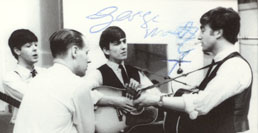 Upon leaving Guildhall, Martin landed a job at EMI as a producer of classical recordings. Soon he was put in charge of EMI's Parlophone division, which specialised in comedy and novelties by such artists as Peter Sellers, the Goons and the cast of Beyond The Fringe. A turning point occurred in Martin's career when he turned down pop vocalist Tommy Steele, whom Decca signed the day after Martin's rejection and made into a major star. Martin was looking for a hit pop act with which to redeem himself when Brian Epstein called.
Upon leaving Guildhall, Martin landed a job at EMI as a producer of classical recordings. Soon he was put in charge of EMI's Parlophone division, which specialised in comedy and novelties by such artists as Peter Sellers, the Goons and the cast of Beyond The Fringe. A turning point occurred in Martin's career when he turned down pop vocalist Tommy Steele, whom Decca signed the day after Martin's rejection and made into a major star. Martin was looking for a hit pop act with which to redeem himself when Brian Epstein called.
Despite his classical roots, Martin was open minded enough to recognise the creative potential of popular music. He also recognised that music wasn't necessarily the issue. Of his first impression of the Beatles, he has said that he was "quite certain that their songwriting ability had no saleable future", but he was charmed by their personalities and offered them a contract.
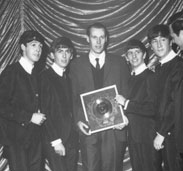 Impressed by the intensely focused aims of the Lennon-McCartney songwriting team, Martin stood by as their ideas developed and helped them along wherever possible. Many of his earliest creative contributions are difficult to assess, but it is known that he sped up "Please Please Me" from a Roy Orbison drawl into a revved up pop classic, arranged intros and endings and played a large role in selecting which songs would appear on a given album. Later, he conceived and performed the accompanying piano solo during "In My Life". When the Beatles began to require non-standard instrumentation around the time of Revolver, Martin scored the instrumentations. Meanwhile, he was recording orchestrated Beatles songs under his own name, making such records as Off The Beatles Track (1964). He also composed the scores for the films A Hard Day's Night, Help! and Yellow Submarine.
Impressed by the intensely focused aims of the Lennon-McCartney songwriting team, Martin stood by as their ideas developed and helped them along wherever possible. Many of his earliest creative contributions are difficult to assess, but it is known that he sped up "Please Please Me" from a Roy Orbison drawl into a revved up pop classic, arranged intros and endings and played a large role in selecting which songs would appear on a given album. Later, he conceived and performed the accompanying piano solo during "In My Life". When the Beatles began to require non-standard instrumentation around the time of Revolver, Martin scored the instrumentations. Meanwhile, he was recording orchestrated Beatles songs under his own name, making such records as Off The Beatles Track (1964). He also composed the scores for the films A Hard Day's Night, Help! and Yellow Submarine.
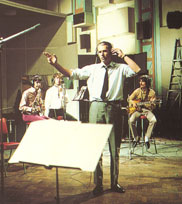 Martin's involvement reached a peak in 1967 with Sgt. Pepper's Lonely Hearts Club Band and Magical Mystery Tour. By this time his job was no longer to capture the group's performances, but rather to translate the fanciful abstractions of their imaginations into recorded sound. His expertise resulted in the colliding organs of "Being For The Benefit Of Mr Kite" and the surreal flavour of that year's masterpiece, "Strawberry Fields Forever".
Martin's involvement reached a peak in 1967 with Sgt. Pepper's Lonely Hearts Club Band and Magical Mystery Tour. By this time his job was no longer to capture the group's performances, but rather to translate the fanciful abstractions of their imaginations into recorded sound. His expertise resulted in the colliding organs of "Being For The Benefit Of Mr Kite" and the surreal flavour of that year's masterpiece, "Strawberry Fields Forever".
After two studio intensive albums, the Beatles decided to concentrate once again on ensemble performances and Martin's role receded accordingly. By 1969, the band was content to record without his supervision. The raw materials that would become Let It Be appear to have been created largely without his participation. When he was asked to return for Abbey Road, he made the group promise to surrender control over the sessions to him and they agreed. Abbey Road became the best selling record the Fab Four made to date. Unfortunately, it was the last album they made together.
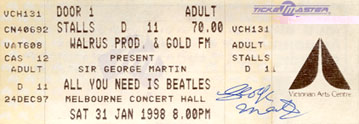
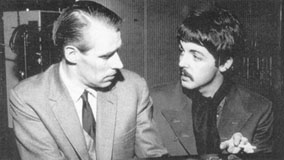 GEORGE MARTIN
GEORGE MARTIN